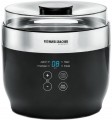Total volume
The total volume of the device allows you to estimate how much product can be prepared in it at a time. In ice cream makers and yogurt makers with a bowl for cottage cheese, the volume is determined by the capacity of this bowl. And if there are several working glasses, the total volume is equal to the sum of all the containers.
Volume of 1 glass
The volume of a separate working container for yoghurt. The division of the total volume into separate glasses simplifies the dosage and speeds up the process of preparing yoghurt; in addition, in this way you can more accurately choose the volume of preparation — after all, it is not always necessary to prepare a full yoghurt maker, sometimes it is enough to “load” only a part of the glasses.
Number of glasses
The number of individual working containers (glasses) of the yoghurt maker. Dividing the total volume into several small containers speeds up the cooking process and facilitates dosage; also yoghurts with different additives can be prepared at the same time in different glasses thanks to this.
Yoghurt container material
Yoghurt containers are usually made of
glass or
plastic. Glass cups are more fragile and heavier than plastic ones; on the other hand, glass is less sensitive to intensive washing, more resistant to overheating, and is considered a more "neutral" material, as it does not tend to release foreign substances (although modern food-grade plastics also meet this requirement).
Number of programs
The presence
of several programs in the device allows you to cook various products without any hassle. The yoghurt maker itself adjusts the right time (and sometimes temperature) for preparing a given dairy product.

